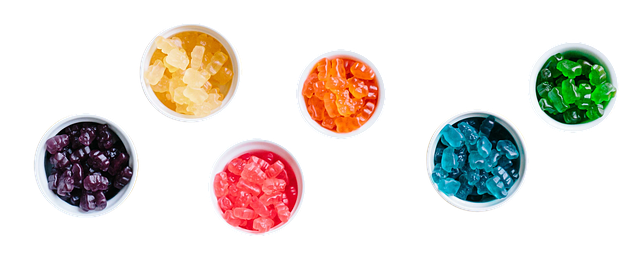Delta-8 Gummies: Unlocking Natural Wellness Potential

Delta-8 Gummies, a natural alternative to synthetic cannabinoids, offer a milder high and potential…….
Understanding Delta-8-Gummies
Delta-8-gummies are a form of edible cannabinoid products derived from the hemp plant, specifically containing delta-8-tetrahydrocannabinol (delta-8-THC). This particular compound is one of the many naturally occurring cannabinoids found in the Cannabis sativa L. plant. While sharing similarities with delta-9-tetrahydrocannabinol (delta-9-THC), which is the primary psychoactive component of marijuana, delta-8-THC is less potent and produces a milder psychoactive effect.
Delta-8-gummies have gained popularity due to their legal status in many jurisdictions where delta-9-THC is restricted or illegal. They are often marketed for their potential therapeutic benefits, including pain relief, anxiety reduction, and improved sleep, without the intense psychoactive effects associated with delta-9-THC.
Global Impact and Trends
The rise of delta-8-gummies has been a global phenomenon, with numerous countries experiencing a surge in their consumption and market presence. The trends surrounding delta-8-gummies are influenced by factors such as changing legal landscapes, consumer preferences for alternative wellness products, and technological advancements in extraction and production methods.
North America leads the market for delta-8-gummies, with the United States being at the forefront due to its complex legal framework that distinguishes between hemp-derived products and marijuana. In Europe, the market is growing as countries navigate their own regulations regarding cannabinoids. Asia is also beginning to see an increase in demand, with countries like South Korea and Japan showing interest due to their existing markets for CBD and other health supplements.
Economic Considerations
The economic impact of delta-8-gummies is multifaceted, affecting various sectors including agriculture, pharmaceuticals, and consumer goods. The market dynamics are driven by consumer demand, which has been consistently rising as awareness of cannabinoids grows. Investment patterns in the cannabis industry have begun to shift towards delta-8-THC as a more legally navigable compound.
The role of delta-8-gummies within economic systems is significant, particularly in rural economies where hemp farming can provide a new revenue stream. Additionally, the creation of new businesses and job opportunities in the extraction, production, marketing, and distribution of these products has had a positive economic effect in several regions.
Technological Advancements
Technological advancements have played a crucial role in the development and refinement of delta-8-gummies. Innovations in CO2 and ethanol extraction techniques have improved the purity and potency of delta-8-THC. Furthermore, advancements in food science have led to the creation of gummies with precise dosages, extended release, and enhanced flavor profiles.
The future potential of technology in this field includes the development of more efficient synthesis processes, which could reduce costs and increase supply. Additionally, there is ongoing research into the potential health benefits of delta-8-THC, which could lead to new product developments and uses.
Policy and Regulation
The policy and regulatory framework governing delta-8-gummies is complex and varies by country and even by state or locality within countries. In the United States, the 2018 Farm Bill legalized hemp derivatives, including delta-8-THC, provided they contain less than 0.3% delta-9-THC. However, the DEA’s position that all types of THC are illegal under federal law has created confusion.
Regulations dictate product labeling, safety standards, and quality control measures to ensure consumer protection. Compliance with these regulations is essential for businesses operating within this market. As legal landscapes evolve, policies will likely become more standardized, affecting the accessibility and legality of delta-8-gummies globally.
Challenges and Criticisms
Delta-8-gummies face several challenges and criticisms, primarily concerning their regulatory status, potential for misuse, and the need for further research into their effects. The legal gray area that surrounds delta-8-THC leads to inconsistencies in access and legal implications for businesses and consumers.
To address these issues, clearer regulations are needed, along with more comprehensive research into the effects of delta-8-THC on health and well-being. Educational campaigns can also help dispel misconceptions and promote responsible consumption.
Case Studies
Several case studies demonstrate successful applications of delta-8-gummies. For instance, a company in Colorado successfully navigated the complex regulatory environment to bring high-quality delta-8-gummies to market, adhering to strict quality control and labeling standards. Another case study involves a farmer in Kentucky who transitioned to hemp farming, significantly increasing their income while providing a sustainable crop.
These success stories highlight the potential economic benefits and the importance of compliance with regulations to ensure consumer safety and legal operation.
Future Prospects
The future prospects for delta-8-gummies are promising, with potential growth in various sectors including healthcare, wellness, and even recreational use as laws continue to evolve. As research advances, we may see a broader understanding of the therapeutic benefits of delta-8-THC, leading to new product developments and increased acceptance among medical professionals and consumers alike.
The continued evolution of the legal landscape will significantly impact the market for delta-8-gummies, potentially expanding their availability and use. Technological advancements will also play a role in improving product quality and safety, further solidifying the place of delta-8-gummies in the wellness industry.
Conclusion
Delta-8-gummies represent a burgeoning market with significant economic, social, and regulatory implications. Their rise is indicative of broader trends in the cannabis industry, including the potential for hemp-derived compounds to provide therapeutic benefits while navigating complex legal frameworks. As the market matures, it will be shaped by advancements in technology, the evolution of policies, and ongoing research into the effects of delta-8-THC. Consumers, businesses, and policymakers must all navigate this evolving landscape to ensure that delta-8-gummies can be enjoyed safely and responsibly.

Delta-8 Gummies, a natural alternative to synthetic cannabinoids, offer a milder high and potential…….

Delta-8 Gummies offer a refined sensory experience with unique flavor profiles derived from subtle c…….

KO Blend Vape Cartridges offer innovative Delta-8 Gummies for a unique vaping experience, appealing…….

Delta-8 Gummies, a hemp-derived cannabinoid, offer therapeutic benefits with milder effects than Del…….

Delta-8 gummies, derived from a minor cannabinoid in cannabis, offer a milder high compared to delta…….

Delta-8 Gummies are a rising trend in cannabis consumption, offering a milder high compared to Delta…….

Delta-8 Gummies, derived from hemp, offer a mild euphoric state without intense effects of Delta-9 T…….